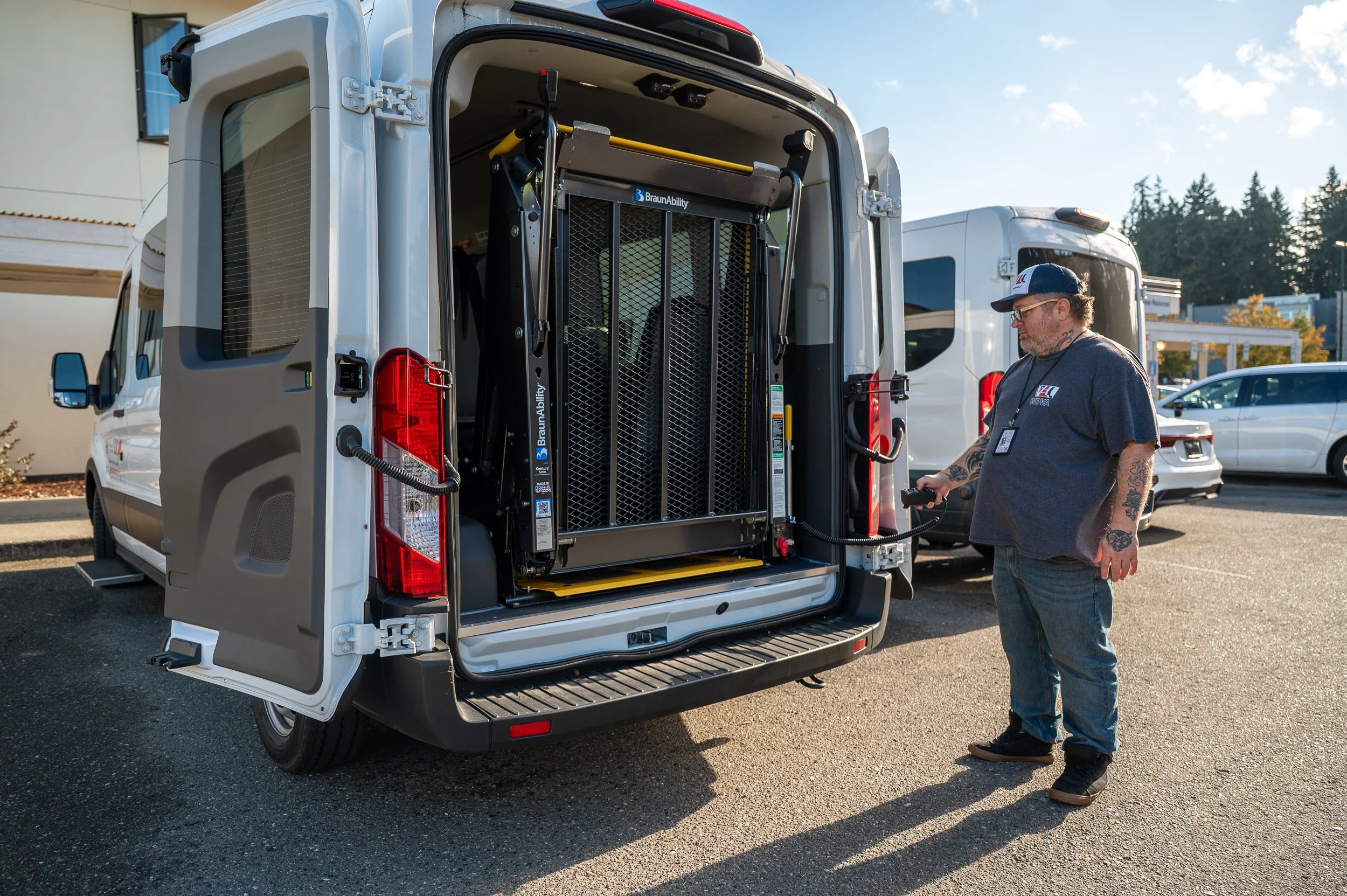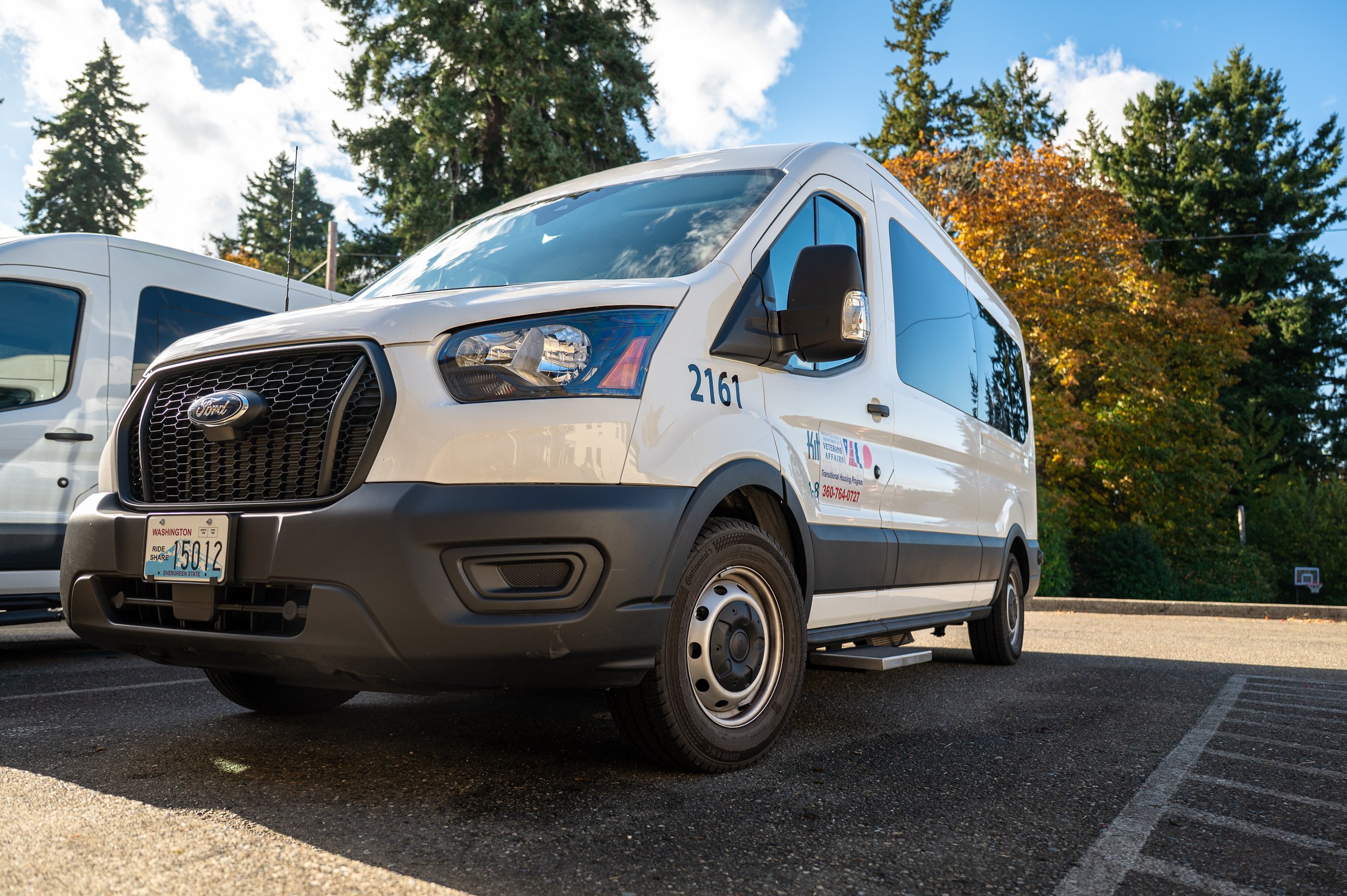How Kitsap Transit’s VanLink program is helping homeless veterans
Transitional Housing Program employee Michael Harrison demonstrates how to operate the lift on a 10-passenger van.
When Bobby Drayton was using drugs, he didn’t care whether he missed his doctor’s appointments.
Even after Drayton sought treatment through the Washington Department of Veterans Affairs’ Building 10 Transitional Housing program (THP), finding consistent transportation to his appointments proved challenging. Building 10 THP was without a wheelchair-accessible van, having just retired its old Chrysler Sprinter bus, which had become unreliable and prone to mechanical breakdowns. Budget constraints meant a new van was out of the question.
Drayton and other homeless veteran clients at the THP don’t have to worry about finding a ride now thanks to Kitsap Transit’s VanLink program, which provided the THP with a new, ADA-compliant, 10-person vehicle.
“This program has really changed my life, especially having the Kitsap Transit van,” Drayton said.
While Kitsap Transit’s ACCESS paratransit service requires elderly people or people with disabilities to reserve a ride at least 24 hours in advance, VanLink provides social service agencies with a dedicated vehicle to use whenever needed to transport their clients to medical and VA appointments, court dates, treatment centers, or recreational outings.
Kitsap Transit handles all the maintenance on the van; the THP only pays the cost of gas.
“It’s life-changing to be able to take (veterans) and not have to worry about ‘Do we have a big enough vehicle to take everybody or are we going to have to have somebody cancel their appointment?’” said Carrie Cooke, the THP’s Case Management Services Supervisor.
Cooke was familiar with VanLink through her previous job at the Washington Veterans Home at Retsil, which shares a campus with the THP in Port Orchard. The THP is one of two transitional housing programs operated by WDVA that provide veterans with a temporary place to stay and supportive services while they work toward finding permanent housing.
Kitsap Transit provides vans to social service agencies to help transport clients to important appointments or recreational outings.
Clients receive their own room and have access to intensive case management services, three meals a day, a laundry facility, and a computer lab, and are referred to specialists who help them navigate VA claims, find employment or apply for qualified benefits, address legal issues, manage finances, address substance abuse issues, and engage in medical and mental health care.
Many of the THP’s homeless veterans face addiction or mental health issues while they work toward permanent housing. The impact of the new vehicle is significant: it means veterans can rely on consistent, reliable transportation to these critical appointments.
“They're back to going to appointments and engaging in their treatment, whether it's substance use disorder treatment or mental health treatment or just getting their physical health care,” Cooke said.
The van’s size means more clients can fit per trip, and the wheelchair lift ensures that veterans with mobility devices are not left behind. In addition to consistency, the van offers veterans an opportunity to get out and enjoy some much-needed recreation.
Michael Harrison, one of the two full-time drivers at the THP, is also a former participant in the program.
“If you’re in addiction, you want to get high or you want to get drunk, you aren’t thinking about going out, and you do away with all of the stuff you like doing,” Harrison said. “Getting away from here and not worrying about how you’re going to get home or where you’re going to be, it’s a sense of freedom.”
For Drayton, the flexibility of transportation means more than just getting to appointments. In the year he has been in the THP, the van has been used to take him and other clients to baseball games, museums, the Space Needle, and on fishing trips.
“Since we’ve got the Kitsap Transit van, more people can go out and do things in public that they’ve never done, and it teaches us to socialize with other people in our community,” Drayton said.
Most importantly, having consistent, reliable transportation takes a load off the minds of the residents.
“This addiction that I have, that’s the number one thing,” Drayton said. “Because if you put too much on your plate, you go back to where you came from.”


